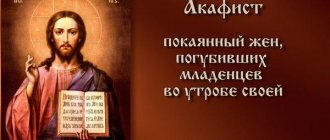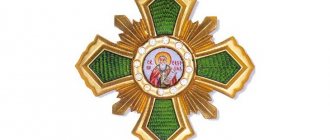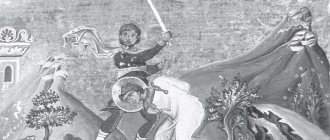The Holy Apostle Paul, warning Orthodox Christians against the deception of heretics, writes: “Remember your teachers who spoke to you the Word of God, looking at the end of their lives, imitate their faith” (Heb., section 334) and “in teaching it is strange and different don't apply."
Here we, without going into a detailed discussion of the manifestations of lawlessness among the children of the Church, will dwell on the most visible and conspicuous evil - barber shaving.
This epidemic disease, the Latin heresy, is quickly instilled among some young people who, having left the due obedience of their parents and not hearing the living, iniquity-convicting, instructive word of the shepherds of the Church, without being embarrassed or ashamed of anyone or anything, enters the holy places in such an un-Christian form. God's temples.
This lustful delusion, which infects some Christians, has always been condemned by the Fathers of the Church and recognized as the work of filthy heretics and heresy.
The Fathers of the Stoglavago Cathedral, discussing barber shaving, set out the following resolution: “The sacred rules forbid all Orthodox Christians not to shave their hair and not to trim their mustache, this is not true of the Orthodox, but the Latin and heretical traditions of the Greek king Constantine Kovalin. And the apostolic and paternal rules of the great people prohibit and deny this... Well, isn’t it written in the law about cutting hair? Do not trim your hair, for your wives are not like husbands. The Creator God judged what Moses said? Let him not take tonsure upon your wedding, for this is an abomination before God; for this was legitimized by Constantine, King Kovalin and the existing heretic. That’s why I know everything, that they are heretical servants, whose hair has been tonsured. But you, who create human things for the sake of pleasing, contrary to the law, will be hated by God, who created us in his own image. If you want to please God, retreat from evil. And this is what God Himself said to Moses, and forbade the holy apostles, and rejected such people from the church, and for the sake of a terrible rebuke, it is inappropriate for the Orthodox to do such a thing” (Stogl., ch. 40).
The apostolic decree prohibiting the evil of barbering contains the following saying: “We must also not spoil the hair on the beard, or change the image of a person contrary to nature. Do not bare, says the law, your beards. For the Creator God made this (being without a beard) suitable for women, but He declared it obscene for men. But you, who bares your beard in order to please, as one who resists the law, will be an abomination to God, who created you in his own image” (Decree of the Holy Apostle. Publishing house Kazan, 1864, p. 6).
The holy apostles and fathers of the Church, recognizing barbering as a heresy, forbidding Orthodox Christians to indulge in this abomination, took various measures to correct this epidemic of barbering. In the Greater Respectful it is stated as follows: “I curse the God-hated, fornicating image of the charm, the soul-destroying heresies of cutting and shaving the brad” (fol. 600v.) The fathers of the Hundred Glavnago Cathedral, in order to finally put an end to the evil of barbering, acted more strictly than set out in the Greater Religion. They set out the following definition: “If someone shaves his hair and dies like this, he is not worthy to serve over him, nor to sing the magpie for him, nor to bring a prosphora, nor to bring a candle for him to church, let him be reckoned with the infidels, for the heretic has become accustomed to this” (chap. 40). And the interpreter of the rules of the church, Zonar, interpreting the 96th rule of the 6th Ecumenical Council and, condemning barber-shaving, says: “And so the fathers of this council paternally punish those who do what they said above, and subject them to excommunication.” This is how the holy apostles and holy fathers collectively defined this; Now let’s listen to how the Fathers of the Church in particular looked at this ulcer of Christianity.
Saint Epiphanius of Cyprus writes: “What is worse and more disgusting than this? The beard - the image of the husband is cut off, and the hair on the head is grown. Regarding the beard in the apostolic decrees, the Word of God and teaching prescribe not to spoil it, that is, not to cut the hair on the beard” (His Creation, part 5, p. 302. Publishing house Moscow, 1863).
St. Maximus the Greek says: “If those who deviate from the commandments of God are cursed, as we hear in sacred hymn, those who destroy their own marriages with a razor are subject to the same oath” (Sermon 137).
The Service Book of Patriarch Joseph says: “And we do not know, in the calico people of Orthodoxy, at which time in Great Russia the heretical disease was present. Just as according to the chronicle books, the legend of the king of the Greeks, and especially the enemy and apostate of the Christian faith and the lawbreaker Konstantin Kovalin and the heretic, cut your hair, or shave, as if you decide to corrupt the God-created kindness, or again decide, according to the chronicle books, to confirm this evil heresy of the new son of Satan the devil, the forerunner of the Antichrist, the enemy and apostate of the Christian faith, the Roman Pope Peter of Gugnivago, as I reinforced this heresy, and commanded the Roman people, and even more so, to do the same with their sacred rites, the same as cutting and shaving their braids. To Epiphanius the Archbishop of Cyprus I call this heresy Eutyches. For Konstantin Tsar Kovalin and the heretic have been legitimized, everyone knows that they are heretical servants, whose brothers were tonsured by him” (Ed. Summer 7155, sheet 621).
Likewise, the Serbian Metropolitan Dimitri wrote: “The Latins have fallen into many heresies: on Holy Pentecost on Saturday and during the week they eat cheese and eggs, and they do not forbid their children during the entire fast. On Saturday and during the week, bowing to the ground is commanded, in addition to the rules of the saints, the Apostle. They shave their braids and trim their mustaches, but the worst and worst of them do this and bite their mustaches... having received all this from the father of his evil son Satan, Pope Peter Gugnivogo, shave his braids and mustaches. For the Lord said to Moses: Let not the swearing come forth upon your brethren, for it is abominable to the Lord” (his book chapter 39, page 502).
Pointing out to the barbers the law of the Church, the instruction, reproof and punishment of the shepherds of Christ's Church, we will also remember the zeal of Christians, canonized as saints, who, fearing the rebuke of the Fathers of the Church, never agreed to carry out the order of the wicked prince Olgerd in order to shave their braids, for which suffered.
In the calendar with lives, printed under Patriarch Joseph in the summer of 7157, it is said: “Anthony, Eustathius and John suffered in the Lithuanian city of Vilna from Prince Olgerd, the first for barber shaving, and for other Christian laws, in the summer of 6849” (see under 14th of April). Under the same number of April, the Chetiy-Minea indicates that Anthony, Eustathius and John were only known by Prince Olgerd to be Christians because, contrary to pagan custom, they grew their hair on their brads.
Such suffering of the holy martyrs for Christian customs, among whom a beard flaunted in the foreground, should serve as an example of modesty and a way of pious life for true Christians. Not shaving or cutting your beard is a Christian matter, an important matter - this is the fulfillment of the law prescribed by the Church, obligatory for believers in God and His Holy Church.
The holy martyrs, having grown their braids as required by the duty of a Christian, showed the wicked prince Olgerd that they were no longer worshipers and servants of the demon, but imitators of the way of life of Christ in the flesh, which he led on earth for the salvation of the human race. Such a pious life and wearing a beard according to Christian custom were commanded to us by the fathers of the 6th Ecumenical Council; for they say: “Having put on Christ through baptism, they vowed to imitate His life in the flesh” (96 rule of the Sixth Ecumenical Personality, complete translation, interpretation of Zonara).
So, cutting and shaving a beard is not a Christian custom, but of filthy heretics, idolaters and non-believers in God and His Holy Church. For such a filthy custom, the church fathers strictly condemn and punish, and put them under oath; and those who have not repented and repented of this lawlessness are deprived of all Christian guidance and remembrance.
We pray to our Lord Jesus Christ that this abomination - barbering in our brotherhood of the same faith - will cease; we also pray to you, our shepherds, that you teach the flock of Christ entrusted to you by God, according to the sacred rules of your children, all Orthodox Christians, that you teach and punish those evil heretical deeds would cease and would live in pure repentance and other virtues.
Unknown Old Believer author
How was a beard treated in Old Testament times?
In the Old Testament law there was a requirement, although not unconditional, about the prohibition of barber shaving (Lev. 19:27). In some cases, shaving the beard could result in dishonor and disgrace (1 Chronicles 19:4-5), but not always (Lev. 14:9). The ancient Jews paid a lot of attention to the beard (Ps. 133:2). It was considered a great insult if someone, being irritated or to express his anger, contempt, plucked his opponent’s beard or grabbed it, sometimes this was done with the aim of “bringing to his senses” the opponent, the enemy (Neh. 13:25), kissing the beard, on the contrary, served as a special sign of respect and friendship. Pulling out hair from a beard, or completely removing it and neglecting its decent appearance served as a sign of deep sadness (1 Ezra 9:3, Isaiah 15:2, Jer. 41:5, Jer. 48:37), instead of cutting the beard as a sign grief could also be limited to covering your beard. An unkempt, unkempt beard could also be considered a sign of a person’s insanity (1 Samuel 21:13-15).
Instructions of the Ancients
It was commanded by the apostolic decrees that men should not bare their beards. For the Lord created us and it is not a human thing to change our appearance, to go against nature. The Old Testament says that no razor should touch the beard of a true believer.
The parable of David’s servant, who returned to him without a beard after obedience, is also memorable. David interpreted this as deprivation of honor—"My servant has been dishonored." And until the servant grew a beard again, the king refused to accept him.
We still remember that one of the many complaints of the Orthodox against the Catholics, who separated them into two large branches of Christianity, was the habit of shaving among the latter. The Orthodox reminded the Latins. What the Scripture says is not to shave your locks.
It only suits wives to walk around with their chins bare. But the Latins ignored this warning, and it, among all others, separated the former brothers in faith.
The famous Council of the Hundred Heads, held in 1551, once again confirmed that an Orthodox husband should have a beard. Moreover, they threatened that there would be neither a magpie, nor a funeral service for the shaven people, and that it would not even be possible to light a candle for him in the church. Yes, a little later the decisions of this council were recognized ... as somewhat old-fashioned and ignorant.
But you shouldn’t be so arrogant about hoary antiquity. Especially to the bearded, gray-haired antiquity. And the ancients were ready to give their lives for their beards. There is a legend that the holy martyrs John, Anthony, Eustathius of Vilna died because they refused to shave their beards at the request of the infidels.
There is another meaning in the desire of Orthodox Christians to wear a beard - the desire to get closer to the image of our Lord Jesus Christ. And in iconography he is bearded and nothing else.
The Old Believers are completely sure that a person cannot enter the Kingdom of God without a beard, shaved, plucked “like chickens.” And even a shaven man will not enter the Old Believer Church. That is why the famous merchant Tretyakov grew a thick Russian beard - he was one of the Old Believers. However, some Old Believers who made a career had to shave. And then before death they repented of this to the priest.
The Church was very zealous about observing the visible difference in the appearance of the sexes. I never liked women with haircuts or women in trousers. And a man’s face, if it is shaved, is no longer so courageous.
What then shall we say about the priesthood, which does not cut hair, although men cut hair? And there was a basis for this in the Old Testament: the prohibition on cutting hair for monasticism is for the rite of the Nazarite. The canon of depicting the face of Jesus also suggests long hair.
When did they start shaving their beards in Russia (or Rus')?
The issue of barber shaving in Russia became especially prominent at the beginning of the 18th century, when the decrees of Emperor Peter I began to persecute the Russian beard. As a matter of fact, the reform began back in 1699, upon the sovereign’s return from abroad. He personally cut off the beards of noble Moscow boyars. From the same year 1699, a copper sign the size of two kopecks has been preserved, with an image on the front side of a beard and mustache, under the words “money taken,” indicating, apparently, that at that time the idea of a monetary fine for a beard arose. True, initially the reform did not affect all classes, but this lasted only until 1705, when it was ordered that everyone throughout Russia (except for clergy) shave their beards, under pain of a fine of 30 to 100 rubles. Shaving was greeted by the population as a violation of piety: “Many of the secular beards were shaved, in obedience to the sovereign’s decree, but those beards were kept in their possession, like a valuable treasure, for placing them together with the body in the coffin after their death, tea that without a beard they will not be accepted into the kingdom of heaven.” The policy of eradicating beards was carried out throughout the 18th century.
Quotes from Scripture
Leviticus 19 1 And the Lord spake unto Moses, saying, 2 Speak unto all the congregation of the children of Israel, and say unto them, Ye shall be holy, for holy am I the Lord your God. 27 Do not cut your head round, and do not spoil the edges of your beard.
Leviticus 21: 1 And the Lord said to Moses, Speak to the priests, the sons of Aaron, and tell them... 5 They shall not shave their heads, nor trim the edges of their beard, nor make cuts on their flesh.
2 Samuel 10:4 And Hanun took David's servants, and shaved each of them half his beard, and cut off their garments in half, even to the waist, and sent them away. 2 Samuel 10:5 When they told David about this, he sent to meet them, because they were very dishonored. And the king ordered to tell them: stay in Jericho until your beards grow, and then return.
2 Samuel 19:24 And Mephibosheth the son of [Jonathan, son of] Saul went out to meet the king. He did not wash his feet, [did not cut his nails,] did not care for his beard and did not wash his clothes from the day the king went out until the day he returned in peace.
Ps. 132:2 It is like precious oil on the head, running down onto the beard, even Aaron’s beard, running down onto the edges of his garment...
Is. 7:20 In that day the Lord will shave the head and the hair of the feet with a razor hired from the other side of the river by the king of Assyria, and even take away the beard.
Jeremiah 1:30 And in their temples sat priests with torn clothes, with shaved heads and beards and bare heads.
Whether it is a sin for an Orthodox Christian to shave his ford and mustache or not, decide for yourself!
Are there any canons prohibiting barber shaving?
There are no canons directly about beards, but there are about hair. Thus, the 21st canon of the Trullo Council reads: “Those who find themselves guilty of crimes contrary to the rules, and for this are subjected to complete and permanent expulsion from their rank, and expelled into the state of the laity, if, coming voluntarily to repentance, they reject the sin for which they were deprived of grace, and they completely remove themselves from this: let them cut their hair in the image of the clergy. If they do not spontaneously desire this, let their hair grow like the laity, as if they preferred conversion in the world to heavenly life.” They cut their hair in the image of the clergy - we are talking here about the huments, that is, the shaved crown, the distinctive sign of the clergy (in the West, such a shaved crown was called a tonsure).
Rule 42 of the same Council condemns monks with long hair. It says: “About the so-called hermits, who in black robes and with long hair, go around the cities, turning among worldly husbands and wives, and dishonor their vow, we define: If they want, having cut their hair, to accept the image of other monastics, then define them in monastery, and counted among the brethren. If they do not want this, then completely expel them from the cities, and let them live in the deserts, from which they got their name.”
And finally, canon 96 of the Council of Trulla: “Those who have put on Christ through baptism have vowed to imitate His life. For this reason, for the sake of the hair on the head, to the detriment of those who behold, who dispose and remove with artificial weavings, and thus deceive unconfirmed souls, we fatherly heal with decent penance.” The meaning of this rule is to maintain moderation in relation to your appearance.
Shaving a beard is a great sin for an Orthodox Christian.
When asked why monks don’t cut their hair and why priests don’t shave their beards, Orthodox experts answer with a quote from the Old Testament.
Shaving a beard means violating the established church prohibition on barbering.
(Leviticus, 19:27; 2 Samuel, 10:1; 1 Chronicles, 19:4); a ban was introduced by the rules of the 6th Ecumenical Council (see interpretation on the 96th rule of Zonar and the Greek Helmsman Pidalion), and other sacred scriptures (the works of St. Epiphanius of Cyprus, St. Cyril of Alexandria, Blessed Theodoret, St. Isidore Pilusiot).
Condemnation of beard cutting can be found in ancient Greek writings (works of Nikon of the Black Mountain, line 37; Nomocanon, line 174).
Priests interpret beard shaving as follows: every person is given his appearance by God and people are not given the right to change it.
The beard is an invariable attribute of priests at all times
Decrees of the Saints Apostle:
Apostolic orders. Rules of the Supreme Apostles
“The beard should also not spoil the hair and change the image of a person contrary to nature.
Do not bare, says the law, your beards.
For the Creator God made this (being without a beard) beautiful for women, but He declared it obscene for men.
But you, who bare your beard in order to please, as one who resists the law, will be an abomination to God, who created you in his own image.”
In the 14th century, in the vicinity of the present city of Vilnius, Christians Anthony, John and Eustathius were killed by pagans for refusing to shave their beards.
The leader of the pagan warriors, Prince Olgerd, seeing the tenacity with which Anthony, John and Eustathius defended their right to bear the beard, even after much torment, decided to let them go if they voluntarily shave off their beards.
The people did not agree to this and they were hanged from a tree.
April 27
day of remembrance of the saints of God Anthony, John and Eustathius, who gave their lives for the faith
The Orthodox Church classified Anthony, John and Eustathius as saints of God, saying that they gave their lives for their faith. These saints are remembered every year on April 27th.
In Russia, priests wear beards according to decisions that are enshrined in the decisions of the Stoglavy Council. The Hundred-Glavy Council of the Russian Church (1551) determined:
“if anyone shaves his hair and dies like this (i.e., without repenting of this sin),
it is not worthy to serve over him, nor to sing magpies over him, nor to serve prosvira,
bring no candle for it to church, for it will be due to the infidels,
from the heretic bo se skill"
(i.e., if one of those shaving his beard dies, a funeral should not be served over him, nor should the magpie be sung, nor should bread or candles be brought to church in his memory; for he is considered an infidel, since he learned this from heretics).
The Holy Scriptures say about beards:
“...the shorn will not rise upon your fence.”
To be clear, you cannot trim your beard. If we believe in God, then we must understand that He created us as He saw fit.
Shaving means not resigning to the will of God, but when we read “Our Father” every day, we repeat: “Thy will be done.”
The Lord divided people into two ranks - men and women, and each commanded his own: men should not change their faces, but should cut the hair on their heads, and women should not cut their hair.
Up until the time of Peter I, cutting a beard was considered a sin, punishable by excommunication from the Church.
The prohibition to shave the Beard was explained by the fact that man was created in the likeness of God and, therefore, it is sinful to distort this appearance in any way by one’s will.
The hairs on the heads of Christ’s disciples are all numbered by God...
(Matt. 10:30; Luke 12:7)
Nowadays, the controversy surrounding beard shaving has diminished. Any clergyman is given freedom to choose the shape and length of his beard.
For lay people, wearing a beard is now a fashion statement rather than something associated with faith in God.
By leaving a comment, you accept the user agreement
Beard in Islam: what does a beard mean for Muslims
Among Muslims, growing a beard is usually classified as “sunnah”. The Sunnah is a sacred narration about the life of Muhammad, these are the actions that the Prophet himself performed. That is, if he wore and grew a beard, then modern Muslims should follow his example. Another question is what exactly the beard should be like. You should not allow the beard to grow haphazardly, shaggy, and tousled. A person who does not take care of his facial hair may be considered unkempt and sloppy, and this is unacceptable among Muslims. There are many stories about when the righteous caliphs ordered men who looked like savages to have their facial hair trimmed and trimmed. A Muslim is supposed to be beautiful not only internally, but also externally. He must be neat and tidy. It is permissible to enter the mosque only in this form; when appearing among your brothers, you need to be an example for people. This is what the Prophet himself bequeathed. That is why, in the modern world, Muslims lead the ranking of the most beautiful and well-groomed bearded men. Having thick and burning black facial hair by nature, they monitor and ennoble it according to religious laws. But it should be noted that it is customary for Muslims to shorten their mustaches, and at least once every forty days. This rule is also mandatory, as it is sunnah. Muslims often wear a beard without a mustache.
Punishment through the beard
In Rus', the beard was valued so much that the most serious crime was desecration of the beard. Thus, according to the “Pskov Judgment Charter” (XIV–XV centuries), for damage or forcible deprivation of a beard one had to pay a gigantic fine of 2 rubles, while for murder the fine was only 1 ruble. Spitting in the beard was considered the most terrible insult, and to set fire to an enemy’s beard meant declaring war on him.
Desecration of beards is often found in chronicles. When envoys came to the prince with unseemly demands, their beards were silently cut off and sent back. And that said more than a thousand words.
If in Ancient Greece someone met a completely shaven person, it meant that he was being punished for some serious offense. In Greece, warriors who chickened out on the battlefield had half their faces shaved off.






